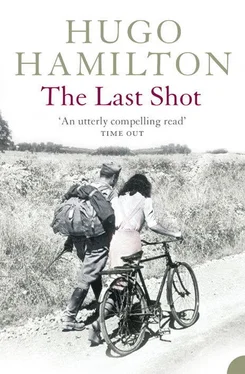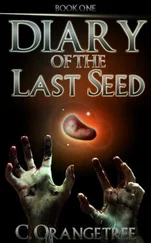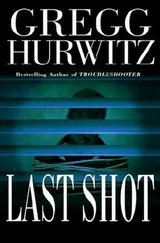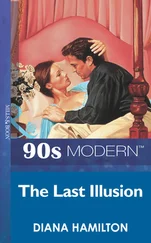Both the father and the barber tried to distract the boy. ‘Look, look in the mirror. Look, there’s a good boy.’ The barber tapped the mirror with his scissors. ‘There’s a good boy. Nearly finished,’ he kept saying.
But the boy soon began to wail. Not so much like crying, but a solid howl; half fear and half mistrust. He kept looking around to see what was going on but he couldn’t understand the purpose of the scissors. He tried to free his arms from his father’s grip. Wisps of cut hair fell into his eyes, tickled his nose and his neck behind his collar. Nobody could explain it to him. The barber got a scented towel and wiped it over the boy’s face, taking away a mixture of saliva, cut hair and tears.
Another armoured car went by outside. The barber managed to deflect the boy’s attention for long enough to clip a semi-circle over the ears. The fingers of his left hand pinned the boy’s head down vigorously. But the sound of the scissors magnified in the boy’s ears to the size of shears and he resumed his howls, louder than ever.
The whole barber’s shop had become occupied with the boy’s haircut. Once again the barber made an attempt to distract the boy. He took out two ivory brushes, clacked them together and gave them to the boy. The barber rushed around, exploiting the moment. It was a race against time, before the boy dropped the brushes again and put his hands up. That was enough. His father released him and the boy jumped down, running into the centre of the room.
‘Vla, vla,’ he said, holding his ears, showing off his haircut to the men waiting on the bench.
That was the morning the Czechs finally decided to liberate themselves from the fascists and hand themselves over to the communists. The grand uprising in Prague had begun. The whole country was rising up in support. In Laun, a man named Jaroslav Süssmerlich walked into the pub U Somolu at 81 Prag Strasse and convened the first meeting of the National Committee. The men at the barber’s shop abandoned their places in the queue and joined him.
They demanded the immediate surrender. They wanted nothing but outright capitulation. By phone, Jaroslav Süssmerlich translated the anger of the town and told the Germans they were ready to attack the garrison. The men from Kladno had already taken the arms dump at Hriskov. But the German commander in Laun made it clear that he had no authority to capitulate until orders came from Prague; from the German High Command. Besides, they held a number of key prisoners; Czech resistance fighters. It became a hostage drama. Negotiations became a race against time. Nobody realized that the Russians were approaching from the north instead of the south.
Bertha Sommer emerged from the church of St Nicholas, pushing the heavy oak door like a child. The idea of heavy oak doors in churches is to make people feel small and innocent; children of God. She adjusted her hat, blessed herself from the font and looked down the steep concrete steps, where she saw an armoured car parked along the kerb. It was the only vehicle in the street. The engine was running. Officer Kern stood beside the driver and both of them looked up at her. There was something wrong. She knew it.
Around her, everything else in the street bore the inertia of centuries. The houses, the dusty windows, the grey roofs, all looked as though they would never change.
Bertha Sommer had a good nose. It was the way Officer Kern looked at her as she descended the church steps that told her something had changed. For a moment, she thought she was being arrested for betrayal of the Reich. Either that, or she was fleeing straight away, back to the German border. She told herself she didn’t care. After the initial fright, there is always a moment of indifference.
She smelled a wisp of woodsmoke drifting down the street. Nothing visible, beyond the faint blue tint in the distance above the houses. It was a reassurance. Bertha knew every kind of smoke. She had smelled all the different smokes of the war: gunsmoke, fires, scorched landscape, phosphor smoke; even the smell of burning hair. She feared and respected every smell. She then got the smell of Officer Kern’s cigarette. Kern looked serious. When he spoke to her, it was back to his official voice. The former intimacy was ignored. She expected the worst.
‘Fräulein Sommer, we have instructions to return to the garrison immediately. By right, I should have conveyed this to you without delay. We must go straight away.’
He held the door of the vehicle for her and whispered, as she held her hat to get in, ‘There’s nothing to worry about.’
Afterwards, she felt foolish to have mistrusted him so much. She felt naïve, and envied the way men always seemed to know everything first. Inside the church, she had been under the brief illusion that it was raining outside, only to come out and find the street dry and the sun trying to break through the clouds at last.
The driver turned the vehicle and headed back through the town, past the square, along the main street towards the hill leading up to the garrison.
‘Apparently there is something going on here in the town,’ Kern said to her in the back of the car. ‘Hauptmann Selders has ordered all personnel off the streets.’
Kern didn’t discuss it any more. She asked him what it meant but he put a finger over his lips and pointed at the silent driver. They all went mute and looked out of the windows. Bertha saw nothing. No sign of anything going on. At the end of the town, she spotted two women hanging out washing. On a wall, she saw a ginger-coloured cat preparing to jump down. Smoke rose from the last three chimneys in the town. Nothing would ever change the speed of smoke rising from a chimney on a calm day in May.
Her own life would soon accelerate beyond recognition. After months and months of waiting, since Christmas, she would finally move into a new, though perhaps uncertain future. Anything was better than waiting. She thought of Caen in Normandy where she had spent most of the war. And the trips to Paris which had been so exciting. Czechoslovakia had provided none of that excitement. It became the place to wait for the war to end. She could only think of home. She could only think of the frustrating irony that the car in which she sat was actually travelling in the wrong direction. East. Into the arms of the Russians.
She turned around to look through the back window at the town. It may be the last look, she thought. Everywhere Bertha Sommer went, she called things by a private, arcane name in her own mind. As the armoured car climbed the hill back towards the garrison, she looked back and called it: the hill of the last time looking back. The morning of the end of the Reich, she said to herself as they drove through the gates.
‘Tonight,’ Officer Kern whispered discreetly to her as she got out of the car. She didn’t respond. She watched him click his heels and bow slightly, before he marched away towards the command centre.
I always thought it was strange that things between Anke and myself ended with a crash. Or was that actually the beginning? It was in Jügen’s car. Just coming off the Autobahn, heading back into the centre of Düsseldorf, we were hit by another car. Don’t ask me how. All I know is that I’m certain it wasn’t my fault. The other car came out of a slip road and hit us on Anke’s side, the passenger side. It was in the evening. Dark. Wet. Autumn. I only remember the bang and the sudden immobility afterwards. It was like being attacked for no reason. Neither Anke nor I suffered any real injuries. It all must have looked much worse than it was because the other car had been overturned by the impact. I thought the occupants must be dead, because nobody moved. But it turned out that the driver, a middle-aged woman, escaped gracefully with nothing more than concussion.
Читать дальше
Конец ознакомительного отрывка
Купить книгу












